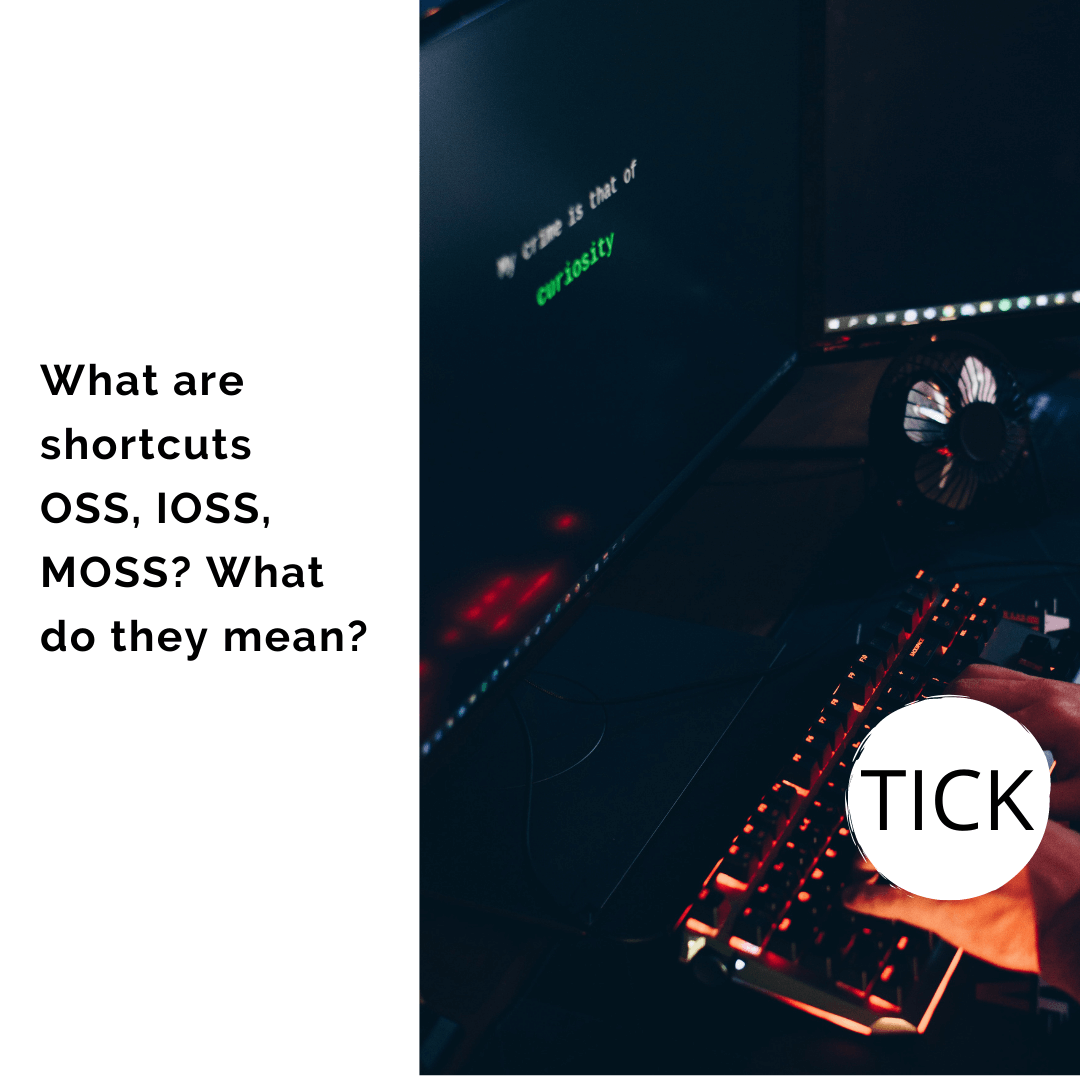As part of the VAT reforms that entered into force on July 1 2021, there is a group of acronyms that are commonly used and often not well understood: IOSS, OSS and MOSS.
These three conditions will shape the long-term way your business operates as the new rules place legal requirements on how VAT is collected, reported and paid.
We’ve put together a handy list to break down the understatements and help you navigate the EU Ecommerce VAT overview on July 1st 2021.
What does OSS mean?
First on the list is “OSS”, the three letters that make up all three acronyms. The OSS is arguably the most important one to understand before delving into the rest as it forms the basis of the VAT reform glossary.
OSS stands for One-Stop Shop , which is a single EU VAT declaration, including the abolition of distance selling thresholds.
This change is called One-Stop Shop or OSS means that B2C sellers will no longer need to fill out complex VAT returns in each country they sell, only one OSS notification in addition to their regular national VAT return which covers any other relevant transactions that they do not can be reported under the special OSS (e.g. holding and moving of stocks across the EU) system.
The most important facts about OSS:
- One-Stop Shop (OSS), replaces and extends the scope of the current MOSS schema, which we will explain later.
- OSS is therefore divided into two categories:
- OSS Union
- Non-Union OSS
- They differ in the types of transactions covered by the program and the people who can access the system.
- Union-OSS is intended for:
- EU-based sellers, for goods shipped within the EU and all services provided to customers in the EU
- Sellers based outside the EU, only for goods shipped within the EU
- Non-EU OSS is reserved for:
- Sellers based outside the EU for all services provided to customers in the EU
What you have to remember:
Non-EU residents can benefit from the simplified OSS declaration by registering as a non-EU taxpayer first. This allows them to be registered with a single EU office, with the possibility of submitting quarterly OSS applications in the same way as e-commerce sellers in the EU.
What does IOSS mean?What does IOSS mean?
IOSS stands for Import One-Stop Shop. This applies to web portals that sellers have access to on July 1, 2021 to comply with the new VAT obligations for e-commerce.
Now, any shipment of goods below 150 EUR that is imported from outside the EU and shipped directly to EU customers will benefit from the import VAT exemption and sellers will only need to charge VAT to their customers at the point of sale (upon checkout).
EU sellers will be able to report such transactions as an IOSS refund in their home country, rather than registering at multiple locations in the EU. Non-EU sellers will only need to register with IOSS in one EU country to be able to declare VAT on such sales.
Key facts about IOSS:
IOSS not only makes it easier for you, the retailer, but also for your customers because they are only billed once at the point of sale. This avoids unexpected costs when goods are delivered as the goods pass through the Green Channel in customs, allowing for quick and efficient release followed by rapid delivery to end customers.
What you need to remember:
As of July 1 2021, the VAT exemption on imported goods below € 22 has been removed, so all goods imported into the EU will be subject to import VAT upon arrival in the EU. And this is the convenience of IOSS, as under this system, import VAT is not charged if the shipment value is less than € 150.
What does MOSS mean?
MOSS stands for Mini One-Stop Shop , an optional digital service system that was converted to OSS on July 1, 2021. MOSS has been in operation since 2015 and originally allowed retailers to settle VAT in one country rather than in many EU countries as standard.
However, only certain types of services were eligible for the scheme and were targeting resellers in the following industries:
- Cross-border telecommunications
- Broadcasting of television and radio programs
- Digital services
These industries included services such as website hosting, software supply, database access, application or music download, online games, and online learning via a distance learning platform.
Key facts about MOSS:
As the MOSS schema has been converted to OSS, many countries automatically convert vendor MOSS registrations to OSS registrations, thus allowing a seamless transition between the two systems.
Regarding the British MOSS, it was withdrawn on January 1, 2021 after Brexit. However, the guidelines still apply to sales made on or before December 31, 2020.
What you need to remember:
The UK MOSS VAT system can continue to be used for:
- Amending MOSS VAT declarations by December 31, 2021.
- Correcting your registration details by December 31, 2024.
Basically, one-stop shops are designed to simplify the process for online marketers, and it’s important to understand IOSS, OSS, and MOSS before deciding which applies to your situation and how to stay compliant throughout the process.
If you find new information difficult to understand or you are unsure how changes in VAT processes will affect your business, we can help. Contact our experts to find out how. More information about our offer can be found here.


